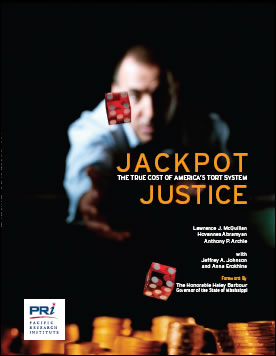
Jackpot injustice still reigns
President Obama made a big show about being open to some Republican reform ideas to rein in lawsuit abuse. Those pledges – which Mr. Obama made twice in major public forums – were worthless. The final version of Obamacare, as signed into law, is a dream come true for big-money plaintiffs’ lawyers.
That was the message in a letter the president of the American Association for Justice wrote to his membership and posted on the group’s Web site. The misnamed AAJ – which was formerly and more accurately called the Association of Trial Lawyers of America – is the house organ for the national plaintiffs’ bar and a major source of campaign cash for congressional Democrats.
Reporting on reformers’ efforts to protect doctors and hospitals from predatory lawsuits, AAJ President Anthony Tarricone wrote, “I am very pleased to report that the health care bill is clear of any [such] provisions. … While there is a provision for demonstration projects, it provides an absolute opt-out clause for plaintiffs at any time.”
In other words, now plaintiffs effectively get even more power because they can pick and choose whichever system they think is most likely to get them the most cash. The demonstration projects – for ideas such as specialized “health courts,” where expert panels replace random juries – therefore become not a real alternative that levels the playing field, but instead just one more tool in the lawyers’ arsenal.
Here’s more from Mr. Tarricone’s letter: “Here are some of the highlights of AAJ’s efforts and the obstacles we overcame: In the House, AAJ defeated tort-reform amendments that were offered in all three committees that amended the original bill. … In the Senate, 28 tort-reform amendments were defeated in the two committees that marked up the bill. On the Senate floor, AAJ decisively defeated a cap on attorneys’ fees.”
These victories for the trial bar come at the expense of taxpayers and everyday patients. Last year, the Congressional Budget Office estimated that medical-liability reforms could save the government an estimated $11 billion each year. Other estimates run as much as four times that amount. In the government and private health care systems combined, according to Lawrence J. McQuillan of the Pacific Research Institute, “defensive medicine wastes patients’ and doctors’ time and costs $191 billion annually, according to the best scholarly research.” Meanwhile, Mr. McQuillan reports, states that have adopted limits on non-economic damage awards – of the sort defeated in Congress – “have 12 percent more physicians per capita than states without caps, according to a study published by the U.S. Department of Health and Human Services.”
Despite the obvious benefits, Obamacare rejects these beneficial reforms. Under Obamacare, ordinary patients get poked and prodded, while the rich lawyers get a continuing prescription for all the milk and honey they can scoop up.
Trial lawyers love Obamacare
Pacific Research Institute
Jackpot injustice still reigns
President Obama made a big show about being open to some Republican reform ideas to rein in lawsuit abuse. Those pledges – which Mr. Obama made twice in major public forums – were worthless. The final version of Obamacare, as signed into law, is a dream come true for big-money plaintiffs’ lawyers.
That was the message in a letter the president of the American Association for Justice wrote to his membership and posted on the group’s Web site. The misnamed AAJ – which was formerly and more accurately called the Association of Trial Lawyers of America – is the house organ for the national plaintiffs’ bar and a major source of campaign cash for congressional Democrats.
Reporting on reformers’ efforts to protect doctors and hospitals from predatory lawsuits, AAJ President Anthony Tarricone wrote, “I am very pleased to report that the health care bill is clear of any [such] provisions. … While there is a provision for demonstration projects, it provides an absolute opt-out clause for plaintiffs at any time.”
In other words, now plaintiffs effectively get even more power because they can pick and choose whichever system they think is most likely to get them the most cash. The demonstration projects – for ideas such as specialized “health courts,” where expert panels replace random juries – therefore become not a real alternative that levels the playing field, but instead just one more tool in the lawyers’ arsenal.
Here’s more from Mr. Tarricone’s letter: “Here are some of the highlights of AAJ’s efforts and the obstacles we overcame: In the House, AAJ defeated tort-reform amendments that were offered in all three committees that amended the original bill. … In the Senate, 28 tort-reform amendments were defeated in the two committees that marked up the bill. On the Senate floor, AAJ decisively defeated a cap on attorneys’ fees.”
These victories for the trial bar come at the expense of taxpayers and everyday patients. Last year, the Congressional Budget Office estimated that medical-liability reforms could save the government an estimated $11 billion each year. Other estimates run as much as four times that amount. In the government and private health care systems combined, according to Lawrence J. McQuillan of the Pacific Research Institute, “defensive medicine wastes patients’ and doctors’ time and costs $191 billion annually, according to the best scholarly research.” Meanwhile, Mr. McQuillan reports, states that have adopted limits on non-economic damage awards – of the sort defeated in Congress – “have 12 percent more physicians per capita than states without caps, according to a study published by the U.S. Department of Health and Human Services.”
Despite the obvious benefits, Obamacare rejects these beneficial reforms. Under Obamacare, ordinary patients get poked and prodded, while the rich lawyers get a continuing prescription for all the milk and honey they can scoop up.
Nothing contained in this blog is to be construed as necessarily reflecting the views of the Pacific Research Institute or as an attempt to thwart or aid the passage of any legislation.